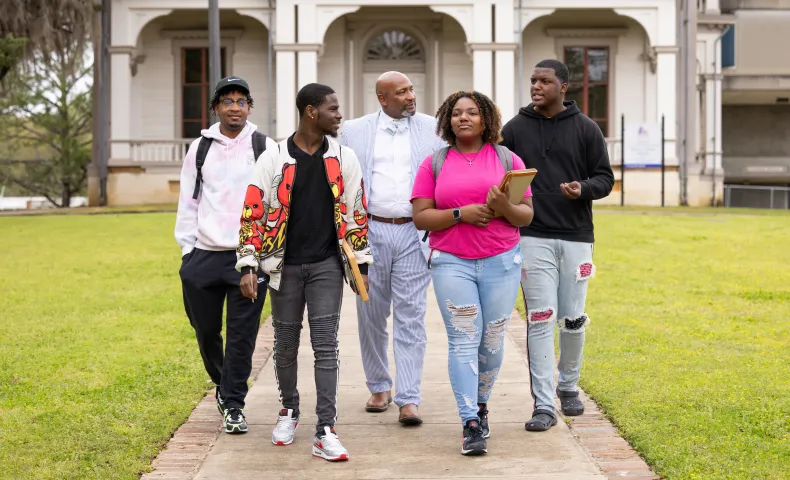 Photo by Allison Shelley / Complete College Photo Library
Photo by Allison Shelley / Complete College Photo Library
Transferring From Community College Is Too Hard
Why This Matters
Community college is an affordable, accessible on-ramp to a bachelor’s degree—especially for students who are low-income, first-generation, or from communities of color. With 2.1 million students at 116 colleges, the California Community Colleges is the largest system of higher education in the country.
But too many students aren’t moving from community college to a bachelor’s degree. Even though the vast majority of students who start at a community college say they want to transfer, only one in five California community college students (21%) who intend to transfer succeed in doing so within four years; and less than 30% transfer within six years. And that’s only if they’re lucky enough to navigate a system full of barriers, delays, and roadblocks.
We’ve built systems for administrators and faculty—but not for the students they’re supposed to serve.
Jessie Ryan, president, Campaign for College Opportunity
The Problem
Transferring should be simple. But instead, it’s one of the most complicated and convoluted aspects of higher education—especially for the students who rely on it most.
One of the biggest barriers is that students take and pass courses at community college, only to find out those credits don’t transfer—or they only count as electives. In a recent survey of adult Americans:
- 20% of students who intended to transfer had to repeat courses they already completed.
- 13% lost or ran out of financial aid because their credits did not transfer.
- 16% gave up on pursuing a certificate or degree altogether because transferring was too difficult.
Transfer isn’t just a paperwork problem. It’s a systemic failure with massive human consequences.
Lara Couturier, partner with Sova, a Haas Jr. grantee partner
One of the main problems with transfers is the process commonly referred to as “course articulation,” where faculty members or administrators at a four-year institution determine whether to formally accept outside course credits for transfer.
In California as in other states, each institution in each system has its own process, often requiring college and university staff to review course content and learning outcomes and determine if a course taken somewhere else will satisfy their institution’s requirements. Students often do not learn about the decision until months, if not years, later. And even then, decisions are inconsistent, and they can be influenced by personal relationships or institutional bias rather than clear standards.
Honestly, a lot of students succeed by accident. But there’s no reason it should come down to luck.
Heather Adams, SovaWe found students entering the CSU system with close to 90 units, even though only 60 units are needed to transfer. That’s a waste of time, energy, and money.
Jessie Ryan, Campaign for College Opportunity
Investing in Solutions
The state of California is a leader in addressing many of the inequities built into the transfer process. As an example, Haas Jr.'s partners at the Campaign for College Opportunity, which has helped lead efforts to establish the Associate Degree for Transfer (ADT), a special community college degree that guarantees admission to a California State University campus. To date, the ADT has helped more than 500,000 students, most of them Latino, move closer to achieving their college dreams.
But too many students still are falling through the cracks of the transfer process. At Haas Jr., we believe the the time is ripe for innovation on this issue.
One promising solution we’re especially focused on is preventing the loss of hard-earned course credits by tapping the power of artificial intelligence (AI). We’re honored to support the ongoing development of a new software platform led by Dr. Zachary Pardos at UC Berkeley’s Computational Approaches to Human Learning research lab. Called CourseWise, the software uses AI to:
- Analyze course learning outcomes across colleges and universities to streamline and standardize the transfer process and reduce credit loss.
- Recommend credit equivalencies based on data—not relationships or assumptions.
- Build student-facing tools to map out personalized, efficient transfer pathways.
To the extent that it is embraced by colleges and universities across California, CourseWise could save students from having to pay for and repeat courses they already took, while reducing the time and costs of earning a bachelor’s degree. It’s a potentially game-changing technology that will allow countless students to chart a clearer, more affordable, more achievable path to graduation.
The Haas, Jr. Fund is excited to be supporting the creation of AI tools that can truly help people find opportunity and a better life. And we know that it’s not enough to create a shiny new tech solution if it’s not going to be used and applied in the real world. That's why we're supporting a new collaborative effort that will enable and empower more colleges and universities to make the most of this new technology platform. The AI Transfer and Articulation Infrastructure Network (ATAIN) will recruit and support institutions to use CourseWise to make the course articulation process more equitable, more efficient, and more student-centered.
Looking Ahead
Improving the transfer process is one of the most powerful equity strategies in higher education. We believe in a future where students don’t lose credits, time, or hope. And we’re partnering with leaders and innovators to build that future. Our focus: ensuring that community college students can transfer hard-earned credits easily and efficiently so they stay on track to a bachelor’s degree.
If we can get this right, we’re not just helping students—we’re unlocking talent, closing racial equity gaps, and fueling economic mobility for California.
Monica Martinez, Program Director, College Success, Evelyn and Walter Haas, Jr. Fund